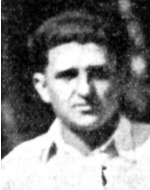Neuman, Zvi (Hirsch)
Was born on April 15, 1925 in the city of Lublin, Poland and completed an elementary school in his city. With the Nazi invasion of Poland and the beginning of the mass murders, many Jews were standing on the edge of a long pit and the murderers used machine guns. When he was lying in the pit under the fallen he would come to life. At night he crawled out of the pit and after many wanderings arrived at a group of partisans he had found in the forest and joined them. He later served in the Russian army and participated in the campaign to liberate Poland. Upon their arrival in western Poland, he retired from the Red Army and joined a Zionist youth kibbutz in Czestochowa. From there he went with his comrades to training in the town of Maykofen in Bavaria and studied carpentry. After wandering through Germany and France, he boarded the Latrun ship, was caught and sent to Cyprus, and on May 20, 1947 was allowed to immigrate to Palestine. Zvi joined his uncle in Magdiel and began to work in his profession. When the War of Independence broke out after the United Nations General Assembly decided on 29 November 1947 to partition the country into two states, he served in the Palmach of the moshava and was soon discovered as an excellent machine gunner with a combat experience and a desire to avenge his enemies. The patrols and guards at the rear did not satisfy him, and he was finally joined with his squad in the Givati Brigade. In his service for the people and the state, he shook off his gloomy memories and knew how to be a cheerful fellow and encouraged his new immigrant friends in the army. The machine gun was his favorite and most precious object. He participated in the battles on the way to Jerusalem and then in the south and the Negev and reached the rank of First Private. He walked with them confidently in the most bitter battles, believing that as long as his machine gun was not hit by a bullet, as he told his friends. He recently took part in the “Yoav” operation to break into the besieged Negev. He left the battles on the outposts in the vicinity of Negba, but on 14 October 1948, without the machine gun, he hit a bullet in the head. He was laid to rest at the Warburg military cemetery. On the combat page of the “Givati” Brigade, dated October 21, 1948, a “Vickers” machine gun was named after him and taken by our men.
